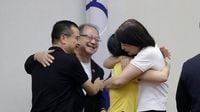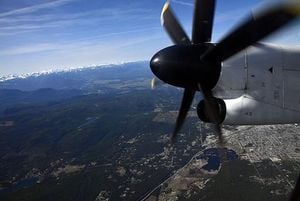On Saturday, July 26, 2025, Taiwanese voters decisively rejected an unprecedented recall effort aimed at unseating 24 opposition Kuomintang (KMT) lawmakers, marking a significant setback for President Lai Ching-te and his Democratic Progressive Party (DPP). This recall campaign, backed by civic groups and the ruling DPP, sought to shift control of Taiwan's 113-seat legislature by removing lawmakers accused of being pro-China and obstructing the government’s agenda. Despite a high-stakes political battle, none of the recall motions met the legal thresholds necessary to remove incumbents, preserving the opposition's slim hold on parliament and intensifying the island’s ongoing political divisions.
The recall elections opened at 8:00 am local time across Taiwan, with polling stations set up in schools, temples, and community centers. By 4:00 pm, polls closed, and preliminary results announced by the Central Election Commission by 7:00 pm confirmed that all 24 targeted KMT lawmakers survived the recall. Under Taiwan’s recall laws, for a legislator to be removed, the number of votes in favor must exceed the votes against and must also represent at least 25 percent of the registered electorate in the district. While six constituencies met the turnout quorum, in each case voters opted to retain their incumbents.
The scale of this recall campaign was historic. No national-level legislature globally has faced such an extensive recall effort, according to Yanina Welp, a research fellow at the Graduate Institute in Geneva. Taiwan is among the few democracies allowing voters to remove elected officials through petitions, but previous efforts were smaller and rarely successful. This mass recall was driven by concerns over the KMT’s perceived pro-China stance, especially given the party’s frequent visits to Beijing and its opposition to key DPP bills, including defense budgets and constitutional court appointments.
President Lai, who won the presidency in 2024 on a pro-sovereignty platform, had hoped the recall would flip the legislative balance in favor of his party, enabling him to push through reforms and increase defense spending amid rising military pressure from Beijing. The KMT, allied with the Taiwan People’s Party (TPP), currently holds 52 seats, while the DPP holds 51. For the DPP to gain a majority, at least six KMT lawmakers needed to be recalled, followed by by-elections to fill those seats. The failure to unseat any lawmakers means the opposition retains the ability to block Lai’s legislative agenda.
In response to the results, Lai posted on Facebook that the recall attempts and opposition efforts are legitimate rights under Taiwan’s constitutional system. He thanked civic groups for their efforts, stating, "These efforts were not in vain. They further established the national direction of resisting communists and protecting Taiwan." He described the outcome as "neither a victory for one side nor a defeat for another," expressing hope that all parties would continue to safeguard Taiwan's democratic system.
KMT chairman Eric Chu hailed the results as proof of Taiwan's mature democracy, calling on Lai to apologize. He emphasized that voters chose stability and wanted the government to focus on governance rather than bitter political fighting. Chu urged the public not to interpret the vote as a referendum on cross-strait relations or as a reflection of pro-China versus pro-Taiwan alignment.
The recall campaign exposed deep political divisions on the island. Lev Nachman, a political science professor at National Taiwan University, described the effort as an "uphill battle" for the DPP in well-organized KMT strongholds. He noted that the recall’s failure makes it harder for Lai to advance his agenda, especially with local elections looming in 2026. Political analyst William Yang of the International Crisis Group warned that the campaign deepened divisions and urged all sides to reflect on how to find common ground on issues critical to Taiwan’s security and prosperity.
On the ground, emotions ran high. Supporters of the recall organized large rallies, with tens of thousands attending events in Taipei on the eve of the vote. Julia Lin, a campaign volunteer, expressed concern that the KMT might now feel "invincible," criticizing their actions as reckless and lacking democratic values. Despite the setback, she insisted that efforts to engage the public and raise awareness about Taiwan’s democratic challenges must continue.
The KMT, meanwhile, denied accusations of being pro-China, stating that maintaining friendlier ties with Beijing is the best way to protect Taiwan’s status quo and peace. They condemned the recall campaign as an anti-democratic power grab by those unwilling to accept the 2024 election results. Retaliatory recall efforts by the KMT against DPP lawmakers failed, with many officials arrested for allegedly falsifying signatures.
The recall campaign also unfolded amid allegations of interference by Beijing. Taiwan’s Mainland Affairs Council cited clear evidence of disinformation campaigns coordinated by the Chinese Communist Party’s Taiwan Affairs Office and state media on platforms like WeChat, TikTok, and Weibo. Beijing has simultaneously increased military pressure through warship and aircraft incursions near the island. The Chinese Taiwan Affairs Office accused Lai of political manipulation and seeking "one-party dominance," labeling the DPP’s actions as "fake democracy, real authoritarianism."
Despite Beijing’s hostility, the United States continues to oppose any unilateral changes to the status quo and remains committed to supplying Taiwan with defensive weapons. US Senators warned earlier in 2025 that the KMT's opposition to increased defense funding posed risks amid escalating threats from the People’s Liberation Army.
The failure of the recall campaign leaves the KMT and its allies in control of the legislature, maintaining their ability to block Lai’s initiatives. Seven more KMT lawmakers face recall votes scheduled for August 23, but analysts suggest Saturday’s results indicate limited public appetite for aggressive recall campaigns. For now, President Lai faces the challenge of navigating a deeply divided legislature while managing growing external pressures from Beijing.
This recall episode highlights the complexities of Taiwan’s vibrant democracy, its internal political struggles, and the shadow cast by cross-strait relations. As the island prepares for future elections in 2028, the political landscape remains fraught with tension, uncertainty, and the ever-present challenge of balancing sovereignty, security, and democratic governance.






